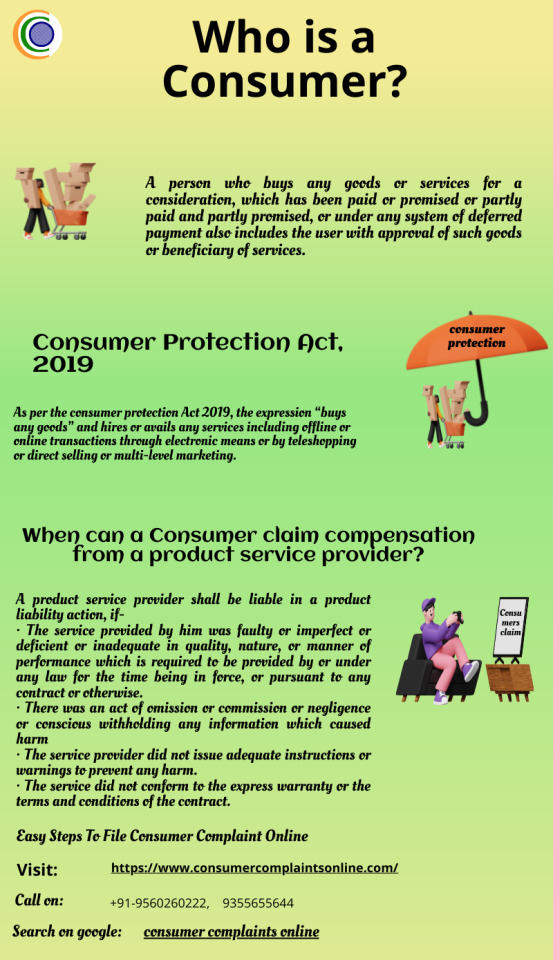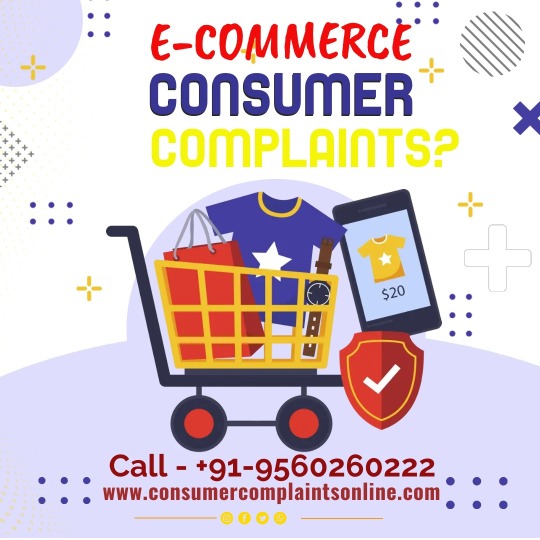Text
False and Misleading Advertisements in India

What is a false or misleading advertisement?
False advertisement is untrue misleading information given to Consumers to get Consumers to buy something, or to come to visit their store.
What is an example of a false or misleading representation?
Courts have found false and misleading representations in these cases - a: manufacturer sold socks, which were not pure cotton, labeled as pure cotton.
Why do they mislead people?
* To convince people to buy their product.
* Get rid of defective products without any hassles.
* Take advantage of customers’ lack of knowledge and trust.
What is the solution to Misleading Advertisements?
a. One can report the misleading advertisement to the Advertising Standard Council of India (ASCI). Committed to the cause of self-regulation in the advertisement, ensuring the protection of the interests of consumers. ASCI was formed with the support of all four sectors connected with advertisement
* Advertisers
* Advertising Agencies
* Media
What are Penalties for Misleading Advertisement?
The New Act introduces, for the first time, a definition of misleading advertisement. It covers false descriptions and guarantees of a product or service. It also covers information that was deliberately concealed from the consumer. If a misleading advertisement is found to be prejudicial to the interest of consumers, then the Central Authority may impose a penalty of up to INR 1,000,000 (One Lake) on a manufacturer. Separately, the New Act has made it a criminal offense to publish false or misleading advertisements for manufacturers and service providers. If found guilty, they could be sentenced to imprisonment for up to 2 (two) years.
Punishment for false or misleading advertisements on celebrities/ brand ambassadors? The New Act fixes liability on celebrities considering that there have been numerous instances in the recent past where consumers have fallen prey to unfair trade practices under the influence of celebrities acting as brand ambassadors. In such cases, it becomes important for the brand ambassadors to take the onus and exercise due diligence to verify the veracity of the claims made in the advertisement to refute liability claims. If a misleading advertisement is found to be prejudicial to the interest of consumers, then the Central Authority may impose a penalty of up to INR 1,000,000 (One Lakh) on the Celebrities/brand ambassador as well.
If you have problems with an item or service you purchased, you have the right to complain. If they don't help, visit consumer complaints online raise your complaints.
#consumer complaints india#misleading advertisement#advertising#legal#legal advisors#consumer complaints#legal consultation#consumer rights#online consumer complaints#law and legal system
8 notes
·
View notes
Text
#consumer complaints#legal consultation#law and legal system#online consumer complaints#consumer complaints india#legal advisors#consumer law#lawyers#legal advice#consumer rights#togel 3d
0 notes
Text

As per the consumer protection Act 2019, the expression “buys any goods” and hires or avails any services including offline or online transactions through electronic means or by teleshopping or direct selling or multi-level marketing.
Consumer Complaints Online
0 notes
Text
What is E-Commerce?
“E-Commerce entity” means any person who owns, operates, or manages a digital or electronic facility or platform for electronic commerce, but does not include a seller offering his goods or services for sale on a marketplace on an e-commerce entity.
Scope and Applicability of E-Commerce?
All goods and services bought or sold over the digital or electronic network including digital products.
All models of e-commerce, including marketplace and inventory models of e-commerce.
All e-commerce retail, including multi-channel single retailers and single brand retailers in single or multiple formats.
All forms of unfair trade practices across all models of e-commerce provided that these rules shall not apply to any activity of a natural person carried out in a personal capacity not being part of any professional or commercial activity undertaken on a regular or systematic basis.
What are the Liabilities of marketplace e-commerce entities?
A marketplace e-commerce entity that seeks to avail the exemption from liability under sub-section (1) of section 79 of the information technology Act, 2000 (21 of 2000) shall comply with sub-section (2) and (3) of that section, l including the provision of the information technology (Intermediary Guidelines) Rules, 2011.
Every marketplace e-commerce entity shall require sellers through an undertaking to ensure that descriptions, images, and other content pertaining to goods or services on their platform is accurate and corresponds directly with the appearance, nature, quality, purpose, and other general features of such good or service.
Every marketplace e-commerce entity shall provide the following information in a clear and accessible manner, displayed prominently to its users at the appropriate place on its platform:
Details about the sellers offering goods and services, including the name of their business, whether registered or not, their geographic address, customer care number, any rating or other aggregated feedback about such seller, and any other information necessary for enabling consumers to make informed decisions at the pre-purchase stage.
Provided that a marketplace e-commerce entity shall, on a request in writing made by a consumer after the purchase of any goods or services on its platform by such consumer, provide him with information regarding the seller from which such consumer has made the purchase, including the principle geographic address of its headquarters and all branches, name, and details of its website, its email address and any other information necessary for communication with the seller for effective dispute resolution.
A ticket number for each complaint lodged through which the consumer can track the status of the complaint.
Information relating to return, refund, exchange, warranty and guarantee, delivery and shipment, modes of payment, grievance redressal mechanism, and any other similar information which may be required by consumers to make informed decisions.
Information on available payment methods, the security of those payment methods, any fees or charges payable by users, the procedure to cancel regular payments under those methods, charge-back options, if any, and the contact information of the relevant payment service provider.
All information provided to it by sellers under sub-rule (5) of rule 6.
An explanation of the main parameters which, individually or collectively, are most significant in determining the ranking of goods or sellers on its platform and the relative importance of those main parameters through an easily and publicly available description drafted in plain and intelligible language.
What are the duties of sellers in the marketplace?
No seller offering goods or services through a marketplace e-commerce entity shall adopt any unfair trade practice whether in the course of the offer on the e-commerce entity’s platform or otherwise.
No such seller shall falsely represent itself as a consumer and post reviews about goods or services or misrepresent the quality or the features of any goods and service.
No seller offering goods or services through a marketplace e-commerce entity shall refuse to take back goods, withdraw or discontinue service purchased or agreed to be purchased, deficient or spurious, or if the goods or services are not of the characteristics or features as advertised or as agreed to, or if such goods or services are delivered late from the stated delivery schedule
Provided that in the case of late delivery, this sub-rule shall not be applied if such late delivery was due to force majeure.
Any seller offering goods or services through a marketplace e-commerce entity shall:-
Have a prior written contract with the respective e-commerce entity in order to undertake or solicit such a sale or offer.
Appoint a grievance officer to acknowledges the receipt of any consumer complaint within forty-eight hours and redresses the complaint within one month from the date of receipt of the complaint
Ensure that the advertisement for marking goods or services is consistent with the actual characteristics, access, and usage conditions of such goods or services.
Provide to the e-commerce entity its legal name, principal geographic address of its headquarters and all branches, the name and details of its website, its e-mail address, customer care contact details such as fax, landline, and mobile numbers, and where applicable, it’s GSTIN and PAN details.
Any seller offering goods or services through a marketplace e-commerce entity shall provide the following information to the e-commerce entity to be displayed on its platform or website:
All contractual information is required to be disclosed by law
Total price in the single figure of any good or service, along with the breakup price for the good or service, showing all the compulsory and voluntary charges such as delivery charges, postage and handling charges, conveyance charges and the applicable tax, as applicable
All mandatory and information provided by applicable laws, and the expiry date of the good being offered for sale, where applicable
All relevant details about the goods and services offered for sale by the seller including country of origin which are necessary for enabling the consumer to make an informed decision at the pre-purchase stage
The name and contact numbers, and designation of the grievance officer for consumer grievance redressal or for reporting any other matter
Name and detail of importer and guarantees related to the authenticity or genuineness of the imported products
Accurate information related to term of exchange, returns and refund including information related to costs of return shipping in a clear and accessible manner.
Relevant detail related to delivery and shipment of such goods or services
Any relevant guarantees or warranties are applicable to such goods or services.
What are the duties and liabilities of inventory e-commerce entities?
Every inventory e-commerce entity shall provide the following information in a clear and accessible manner, displayed prominently to its users:
Accurate information related to return, refund, exchange, warranty and guarantee, delivery and shipment, cost of return shipping, mode of payment, grievance redressal mechanism, and any other similar information which may be required by consumers to make informed decisions.
All mandatory notice and information required by applicable laws
Information on available payment methods, the security of those payment methods, the procedure to cancel regular payments under those methods, any fees or charges payable by users, charge options if any, and the contact information of the relevant payment service provider
All contractual information required to be disclosed by law
Total price in single figure of any good or service along with the breakup price for the good or service, showing all the compulsory and voluntary charges, such as delivery charges, postage and handling charges, conveyance charges and the applicable tax
A ticket number for each complaint lodged, through which the consumer can track the status of their complaint.
No inventory e-commerce entity shall falsely represent itself as a consumer and post reviews about goods and services or misrepresent the quality or the features of any goods or services.
Every inventory e-commerce entity shall ensure that the advertisements for marketing of goods or services are consistent with the actual characteristics, access, and usage conditions of such goods or services.
Any inventory e-commerce entity which explicitly or implicitly vouches for the authenticity of the goods or services sold by it, or guarantees that such goods or services are authentic, shall bear appropriate liability in any action related to the authenticity of such good or service.
Nowadays, everybody does online shopping through various platforms, and during shopping, consumers face much fraud like online payment, product difficulty, etc. If you are facing this kind of fraud? Want to complaints against, Raise your complaints on Consumer Complaints Online portal forum. The company will fight for your right and support customer to get their claim.
#consumer rights#consumer complaints online#legal advice#law and legal system#legal consultation#consumer law#online consumer complaints#consumer complaints#lawyers#legal advisors#consumer complaints india
0 notes
Text

Ecommerce Customer Complaints Online
If you have a defective product, don't hesitate to file a complaint and get the process started. With the right documentation, you can get your issue resolved and hold the company accountable for their products. Visit Consumercomplaintsonline.com register your complaints along with company details and related documents. The company will fight for your right and support customer to get their claim.
#consumer law#consumer rights#legal consultation#ecommerce company#legal advisors#law and legal system#consumer complaints india#consumer complaints
0 notes
Text
Cyber Crime Complaint Online in India

What is cyber fraud?
Cyber fraud is any type of fraudulent activity that takes place online. This can include anything from consumer complaints and identity theft to phishing schemes and credit card fraud. Cyber fraud is a growing problem as more and more people conduct business and personal transactions online.
There are a few things you can do to protect yourself from cyber fraud. First, be aware of the most common types of fraud. This will help you to be on the lookout for suspicious activity. Second, make sure you have strong security measures in place on your computer and other devices. This includes things like antivirus software and a firewall. Finally, never give out personal or financial information online unless you are absolutely sure it is safe to do so.
If you think you may have been a victim of cyber fraud, the first thing you should do is contact your bank or credit card company. They will be able to help you determine if there has been any unauthorized activity on your account. You should also file a report with the Federal Trade Commission. This will help to create a paper trail and may help to catch the person responsible for the fraud.
Types of cyber fraud
There are a variety of different types of cyber fraud, and it is important to be aware of them. Here are some of the most common:
1. Phishing Scams
Phishing scams are one of the most common types of cyber fraud. This is where criminals send out emails or texts pretending to be from a legitimate company or organization. They will try to trick you into clicking on a link or giving them personal information. Phishing scams can be very sophisticated and can be very difficult to spot.
2. Identity Theft
Identity theft is another common type of cyber fraud. This is where criminals steal your personal information, such as your name, address, date of birth, or social security number. They can then use this information to open new accounts, or to commit other types of fraud.
3. Fake Websites
Another type of cyber fraud is creating fake websites. This is where criminals create a website that looks like a legitimate website, but is actually a fake. They will often use these websites to phish for personal information or to install malware.
4. Malware
Malware is a type of software that is designed to harm your computer. It can be used to steal personal information, or to take control of your computer. Malware can be installed on your computer without your knowledge, and can be very difficult to remove What is cyber fraud?
Cyber fraud is any type of fraudulent activity that takes place online. This can include anything from consumer complaints and identity theft to phishing schemes and credit card fraud. Cyber fraud is a growing problem as more and more people conduct business and personal transactions online.
Process of Cyber Fraud Complaints?
If you've been a victim of cyber fraud, you know how frustrating it can be. You may feel like you're never going to get your money back, or that the process is just too complicated. But there are steps you can take to file a cyber-fraud complaint and get your money back.
The first step is to contact the company where you made the purchase. If you used a credit card, you can also dispute the charges with your credit card company. They may be able to help you get your money back.
Next, you'll need to file a police report. This is important because it will give law enforcement a record of the crime. Be sure to include as much detail as possible, including the date, time, and amount of money involved.
Then, you can file a complaint with NCDRC. The NCDRC keeps track of complaints about fraud and scams, and they can help you get your money back.
Filing a complaint may seem like a lot of work, but it's important to do if you've been the victim of cyber fraud. By taking these steps, you can help law enforcement catch the criminals and get your money back.
How Consumer Complaints Online Help?
Do you have a problem with a purchase you made online? Or are you the victim of cyber fraud? Either way, consumer complaints online can help you get your claim.
When you make a purchase online, you are entitled to a certain level of protection. If something goes wrong, you can file a complaint with the merchant. But what if the merchant doesn't respond? Or what if you're the victim of cyber fraud?
In either case, NCDRC. The NCDRC is an agency that helps consumers get their claims.
When you file a complaint with the NCDRC, it will investigate the matter and try to resolve it. If the NCDRC finds that the merchant has violated the law, it can take enforcement action against the merchant.
The NCDRC can also help you get your money back. If you've been the victim of cyber fraud, the NCDRC can help you get your money back from your bank or credit card company.
So if you have a problem with a purchase you made online, or if you've been the victim of cyber fraud, consumer complaints online can help you get your claim.
#cyber crime complaint#consumer complaints india#legal advice#cyber fraud#cyber attacks#cyber punk#online consumer complaints#Ecommerce Complaints#complaint against indra god
0 notes
Text
Consumer complaints online in India
Nowadays, everybody does online shopping through various platforms, and during shopping, consumers face much fraud like online payment, product difficulty, etc. If you are facing this kind of fraud? Want to complaints against, Contact Consumercomplaintsonline.com is a leading digital platform in India for resolving all types of consumer complaints. Register your complaint along with company details and related documents. The company will fight for your right and support customer to get their claim.
#consumer complaints india#legal consultation#consumer complaints#online consumer complaints#consumer law#legal advisors
0 notes
Text
#companies#consumer complaints#consumer complaints india#legal advisors#legal consultation#law and legal system#legal advice#consumer rights
0 notes
Text

Consumercomplaintsonline.com is a leading digital platform in India for resolving all types of consumer complaints. Register your complaints along with company details and related documents. The company will fight for your right and support customer to get their claim.
0 notes
Text

Consumercomplaintsonline.com is a leading digital platform in India for resolving all types of consumer complaints. Register your complaints along with company details and related documents. The company will fight for your right and support customer to get their claim.
#legal advice#legal advisors#consumer complaints#law and legal system#lawyers#legal#legal consultation
0 notes
Text
Consumer complaints online
Are you facing any kind of consumer fraud, want to compliant against, to contact the Consumer Complaints Online team is a group of volunteers who help consumers resolve their complaints. We are Consultants and legal team, who have been working to help and support consumers in standing against business malpractices.
1 note
·
View note